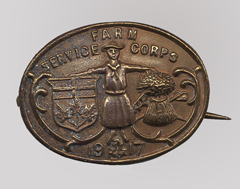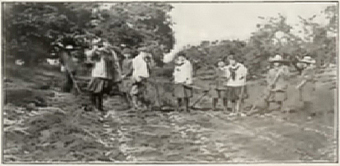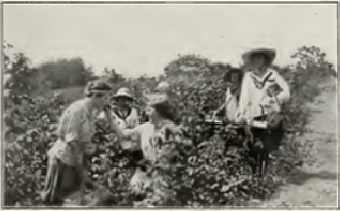Dressed in loosefitting bloomers and straw sun hats, U of T’s women undergraduates spent their summer breaks planting and hoeing in service of Canada’s war effort. In 1917 and 1918 hundreds of U of T “farmerettes” signed up for national service on Ontario farms, replacing the labour of men lost to military service.
The young women performed all but the heaviest agricultural tasks. In the fields, they planted, weeded and pruned the crops. At harvest time, they picked and packed fruits and vegetables for shipping, and then travelled into town to help sell the produce at market. Living conditions ranged from YWCA-sponsored residences to musty military tents.
Food production was critical to Canada’s wartime economy. Farmers were expected to do their patriotic duty by maximizing output to feed troops at home and abroad. The government also entreated young men and women to do their part.

Ontarians took great interest in the farmerettes. Most hailed from urban areas and had little-to-no experience with farm work. Newspapers focused on the novelty and offered regular (and frequently patronizing) updates on how the women were coping with the demands of farm life. The Toronto Daily Star tempted readers with headlines such as: “Plucky Farmerettes Put in Hard Work: But it is not a Bed of Roses, as One City Girl Found Out”; “Mary Feeds her Little Lamb, also Pigs and Other Farm Pets”; and even “One Farmerette Sat on Snapping Turtle, She Thought it was a Nice Smooth Stone.”

Reports from the farmerettes themselves characterize the experience as both gruelling and gratifying. Many complained of intense heat, long hours, low pay and poor working conditions. The women protested their rates of pay and the length of the season and through collective action managed to negotiate better wages and conditions.
Yet despite these challenges, farmerettes were intensely proud of their contributions to Canada’s war effort: “The main motive of the college girl, in spending her holiday in war work, was to serve her country,” related Mossie Waddington (BA 1911 Trinity, MA 1913, PhD 1919), who would become Dean of Women at University College and later at Trinity College. Many women also felt a sense of liberation as they stepped into non-traditional roles. Their work on farms and in factories and offices challenged gender norms and practices. “In agriculture,” declared Margaret Wrong in the Varsity Magazine Supplement, “it has been proved that women can take the place of men without injury to health or to the work in hand.”
Recent Posts
People Worry That AI Will Replace Workers. But It Could Make Some More Productive
These scholars say artificial intelligence could help reduce income inequality
A Sentinel for Global Health
AI is promising a better – and faster – way to monitor the world for emerging medical threats
The Age of Deception
AI is generating a disinformation arms race. The window to stop it may be closing






One Response to “ Farmerettes Help at Home ”
It was good to read about the farmerettes of the First World War on November 11. I recently published a book called Onion Skins and Peach Fuzz: Memories of Ontario Farmerettes. Finding farmerettes who were mostly in their late 80s and 90s and collecting their stories and photos into a book, which has been nominated for a women's history award, was an amazing journey.